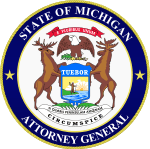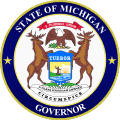Michigan Attorney General
The Attorney General of Michigan is the fourth-ranking official in the U.S. state of Michigan. The officeholder is elected statewide in the November general election alongside the governor, lieutenant governor, secretary of state, members of the Senate and members of the House of Representatives.
| Attorney General of the State of Michigan | |
|---|---|
 Seal of the Attorney General | |
| Michigan Department of Attorney General | |
| Style | The Honorable |
| Residence | Private |
| Appointer | Popular Election |
| Term length | 4 Years, Renewable Once |
| Inaugural holder | Daniel LeRoy |
| Formation | 1837 |
| Website | www |
Since the Michigan Constitution of 1963 was adopted, the attorney general has served a term of four years. The officeholder is also limited to two terms, for a total of eight possible years of service; ten possible years of service if the officeholder serves two full terms and less than half of one term as a replacement. Until 1950, the attorney general was appointed by the governor.
Inasmuch as the office of Attorney General has common law powers as the chief law enforcement officer of the State, he may exercise the powers of a peace officer and may appoint special agents having this status to assist him in enforcing his powers and carrying out his functions (AG Opinion No. 5236,10/20/1977).
Michigan law, MCL 14.32, provides that "[i]t shall be the duty of the attorney general, when required, to give his opinion upon all questions of law submitted to him by the legislature, or by either branch thereof, or by the governor, auditor general, treasurer or any other state officer . . . ."
Michigan's current attorney general is Democrat Dana Nessel, who was elected in November 2018, and sworn into office on January 1, 2019.
Courtesy title
The attorney general traditionally receives the courtesy title of The Honorable for life.
Source: Michigan Manual 2003-2004, Chapter IV, Former Officials of Michigan
External links
- Michigan Attorney General official website
- Michigan Attorney General articles at Legal Newsline Legal Journal
- Michigan Attorney General articles at ABA Journal
- News and Commentary at FindLaw
- Michigan Compiled Laws at Law.Justia.com
- U.S. Supreme Court Opinions - "Cases with title containing: State of Michigan" at FindLaw
- State Bar of Michigan
- Michigan Attorney General Bill Schuette profile at National Association of Attorneys General
- Press releases at Michigan Attorney General
| Wikimedia Commons has media related to Attorneys General of Michigan. |
.jpg)
